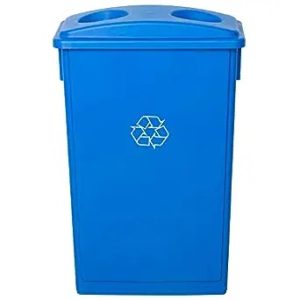Recycle Bins
In an era where environmental consciousness is on the rise, adopting sustainable practices in our daily lives is crucial. One such simple yet impactful step is to introduce recycling trash cans into your household. This small change can yield significant advantages, making it easier to sort recyclables from regular waste while contributing to a greener planet. The primary advantage of having a separate recycling trash can at home is the ease it brings to sorting recyclables. Instead of rummaging through a single bin, you can simply toss recyclable items into the designated can, saving time and effort. By keeping recyclables separate, you reduce the chances of contamination. Food residues and non-recyclable materials can compromise the quality of recyclables, making them less likely to be processed effectively. When recycling is made convenient, people are more likely to participate. Having a dedicated bin for recyclables increases the chances that you and your family will actively engage in recycling, thus improving recycling rates. Recycling conserves valuable resources, reduces energy consumption, and minimizes the need for landfills. By segregating recyclables from regular trash, you are directly contributing to environmental preservation. Having a separate recycling bin at home serves as a valuable educational tool, especially for children. It teaches them the importance of responsible waste management and instills eco-conscious habits from an early age.
Breaking Down Barriers: How Compostable Bags Champion Ocean Conservation and Environmental Harmony
Eco-friendly compostable trash bags offer several benefits compared to regular plastic trash bags, particularly in terms of their impact on the environment and oceans. Here are some key points to consider:
1. Biodegradability and Compostability:
- Eco-friendly compostable trash bags are made from biodegradable materials, such as plant-based plastics (PLA) or other renewable resources.
- They break down more quickly and naturally compared to traditional plastic bags, which can take hundreds of years to decompose.
2. Reduced Plastic Pollution:
- Plastic pollution is a significant problem for the environment and oceans. Regular plastic bags often end up in landfills or as litter, causing harm to wildlife and ecosystems.
- Compostable bags help reduce the accumulation of plastic waste and its negative impact on the environment.
3. Minimized Carbon Footprint:
- Compostable bags are generally made from renewable resources, which can have a lower carbon footprint compared to petroleum-based plastics used in regular trash bags.
- Manufacturing compostable bags often produces fewer greenhouse gas emissions.
4. Contribution to Soil Health:
- Compostable bags can be used to collect organic waste and food scraps, which can then be composted along with the bag.
- The compost produced enriches soil quality and promotes plant growth, reducing the need for chemical fertilizers.
5. Marine and Wildlife Protection:
- Regular plastic bags can easily find their way into water bodies and oceans, where they harm marine life and contribute to the formation of microplastics.
- Compostable bags are less likely to persist in marine environments, reducing the risk of ingestion by marine animals and the overall impact on aquatic ecosystems.
6. Support for Circular Economy:
- Compostable bags are often designed to fit within a circular economy model, where materials are designed to be regenerative and reusable.
- Properly composted bags can contribute to creating nutrient-rich soil, closing the loop on waste disposal.
7. Consumer Awareness and Behavior:
- The use of compostable bags encourages consumers to be more mindful of their waste and disposal practices.
- It promotes a shift toward more sustainable choices and lifestyles.
8. Government and Industry Incentives:
- Some governments and industries provide incentives for using compostable bags or impose regulations to reduce plastic waste.
- This encourages businesses and individuals to opt for more eco-friendly alternatives.
While eco-friendly compostable bags have numerous advantages, it’s important to note that their benefits are most significant when they are used and disposed of correctly. Compostable bags often require specific composting conditions to break down properly. If they end up in regular landfill environments, their biodegradation may be slow, and the benefits may not be fully realized. Therefore, education about proper disposal methods and the importance of composting is essential to maximize the positive impact of compostable bags on the environment and oceans.

